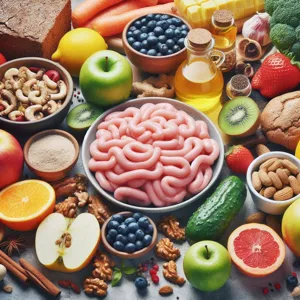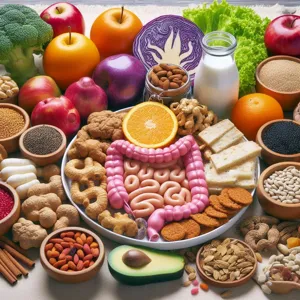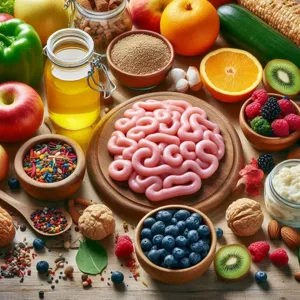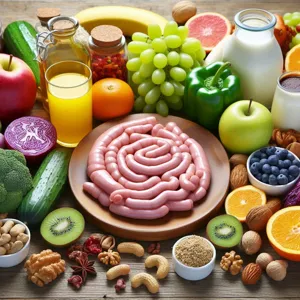In the quest for overall wellness, the gut often takes center stage, acting as the body’s intricate control center for digestion, immunity, and even mood regulation.
A balanced gut microbiome is crucial not just for physical health but also for mental well-being, making it essential to nourish it with the right foods. Enter superfoods—nutrient-dense powerhouses that can significantly enhance gut health and contribute to a happier lifestyle. From fiber-rich legumes to probiotic-packed fermented delights, these superfoods offer a delicious way to support your digestive system while tantalizing your taste buds. In this blog post, we’ll explore the top 10 superfoods that not only promote a healthier gut but also elevate your overall vitality, ensuring you feel your best every day. Get ready to discover how simple dietary changes can lead to profound benefits for your gut and your happiness!
1. Understanding the Gut-Brain Connection

The gut-brain connection is a fascinating and complex relationship that plays a critical role in our overall health and well-being. Often referred to as the “second brain,” our gut is populated by trillions of microorganisms—collectively known as the gut microbiome—that influence not just our digestive health but also our mood, emotions, and cognitive functions. Research has shown that the gut and brain communicate bi-directionally through a myriad of pathways, including the vagus nerve, hormones, and immune responses, forming a dynamic system that can significantly affect how we feel both physically and mentally.
When our gut is healthy and balanced, it produces a wealth of neurotransmitters, including serotonin, which is often dubbed the “happy hormone.” In fact, about 90% of the body’s serotonin is produced in the gut, highlighting its vital role in regulating mood and emotional health. Conversely, an imbalanced gut microbiome—often a result of poor diet, stress, or antibiotic use—can lead to dysbiosis, which has been linked to anxiety, depression, and various mood disorders.
Understanding this intricate connection is essential for anyone seeking to enhance their gut health and, by extension, their mental well-being. By focusing on nourishing our gut with specific superfoods, we can promote a healthier microbiome, paving the way for improved mood, reduced stress, and enhanced cognitive function. In the following sections, we’ll delve into the top superfoods that can support this vital connection and help cultivate a happier, healthier gut.
2. What Are Superfoods?
Superfoods are nutrient-rich foods that are thought to be particularly beneficial for health and well-being. While there is no official scientific definition for “superfood,” the term is commonly used to describe foods that are packed with vitamins, minerals, antioxidants, and other essential nutrients that can contribute to overall health. These foods often boast high levels of fiber, healthy fats, and phytochemicals, making them powerful allies in maintaining a balanced diet and promoting gut health.
In essence, superfoods are often derived from natural sources, such as fruits, vegetables, grains, nuts, and seeds, that have been shown to offer extraordinary health benefits. For example, blueberries are known for their high antioxidant content, which can help combat oxidative stress, while leafy greens like kale and spinach provide a wealth of vitamins A, C, and K, along with fiber that supports digestion.
What makes superfoods particularly exciting is their ability to support gut health, a crucial aspect of overall physical and mental well-being. Many superfoods contain prebiotics—non-digestible fibers that feed the good bacteria in the gut—helping to create a balanced microbiome. By incorporating these nutrient-dense foods into your diet, you can not only nourish your body but also cultivate a happier, healthier gut that promotes digestion and boosts your immune system. As we delve deeper into our list, you’ll discover specific superfoods that can elevate your gut health and enhance your overall vitality.
3. The Importance of Gut Health

Gut health is often referred to as the cornerstone of overall well-being, and for good reason. The gut, housing trillions of bacteria known as the gut microbiome, plays a crucial role in digestion, immune function, and even mental health. When your gut is balanced and healthy, it efficiently processes nutrients and absorbs vitamins, leading to increased energy levels and improved mood. Conversely, an unhealthy gut can lead to a myriad of issues, including digestive disorders, chronic fatigue, and even anxiety or depression.
Recent research has shown that the gut is often called the “second brain.” This is due to the complex network of neurons lining the intestinal tract, which communicates with the brain and influences how we feel. An imbalance in gut bacteria can trigger inflammation, which has been linked to numerous health problems, from autoimmune diseases to metabolic disorders.
Maintaining gut health requires a delicate balance between beneficial bacteria and harmful pathogens. A diet rich in fiber, antioxidants, and fermented foods can promote this balance, helping to foster a thriving microbiome. Furthermore, a healthy gut can enhance your immune system, making you less susceptible to infections and illnesses. By prioritizing gut health, you not only improve your digestion but also boost your overall quality of life, paving the way for a happier and healthier you.
4. Superfood #1: Fermented Foods
When it comes to nurturing a happier, healthier gut, fermented foods reign supreme as one of the top superfoods you can incorporate into your diet. These culinary treasures are packed with probiotics—beneficial bacteria that play a pivotal role in gut health. Fermentation is an ancient preservation method that transforms ordinary foods into nutrient-rich powerhouses, amplifying their health benefits and making them easier to digest.
Think of staples like yogurt, kimchi, sauerkraut, kefir, and kombucha. Each of these delights brings a unique flavor profile and an array of probiotics that may help balance the gut microbiome. For instance, yogurt is not only creamy and delicious but also contributes to improved digestion and immune function, thanks to its live cultures. Kimchi and sauerkraut, on the other hand, are vibrant, tangy, and spicy, offering a delightful crunch while delivering a hefty dose of vitamins and minerals alongside their probiotic benefits.
In addition to the gut-friendly bacteria, fermented foods are often rich in vitamins, such as B vitamins and vitamin K, as well as enzymes that aid in digestion. They can also help reduce inflammation in the gut and support overall health. For those looking to boost their mood, studies suggest that a healthy gut may influence mental well-being, making fermented foods a double win for both your digestive system and emotional health.
To reap the benefits, consider adding a scoop of yogurt to your morning smoothie, enjoying a side of kimchi with your lunch, or sipping on a refreshing glass of kombucha in the afternoon. The options are endless, and the flavors are as diverse as the cultures from which they originate. Embrace the delicious world of fermented foods and watch as your gut health flourishes, paving the way for a happier, healthier you!
5. Superfood #2: Leafy Greens

Leafy greens are often hailed as the unsung heroes of a healthy diet, and for good reason. Packed with essential nutrients and fiber, these vibrant vegetables play a crucial role in promoting gut health and overall well-being. From kale and spinach to Swiss chard and arugula, leafy greens are abundant in vitamins A, C, and K, as well as minerals like magnesium and iron. Their high fiber content is especially beneficial for gut health, as it aids in digestion and helps maintain a balanced microbiome.
Incorporating leafy greens into your meals can be as simple as tossing a handful of fresh spinach into your morning smoothie or creating a hearty salad filled with mixed greens, colorful vegetables, and a light vinaigrette. Not only do they add a delightful crunch and vibrant color to your plate, but they also provide a wealth of antioxidants that combat inflammation and support a thriving gut environment.
Consider experimenting with different varieties and cooking methods to keep things exciting. Sautéed kale with garlic and olive oil makes for a delicious side dish, while roasted Brussels sprouts can be a satisfying addition to any meal. By prioritizing leafy greens in your diet, you’re not just enhancing your meals; you’re also nurturing your gut, paving the way for improved digestion and a happier, healthier you.
6. Superfood #3: Berries
Berries are not only a delightful addition to your meals but also pack a powerful punch when it comes to gut health. These vibrant, juicy fruits—think blueberries, strawberries, raspberries, and blackberries—are loaded with antioxidants, vitamins, and dietary fiber, making them a superfood that your gut will love.
One of the standout benefits of berries is their high fiber content, particularly soluble fiber, which is essential for a healthy digestive system. This type of fiber helps regulate bowel movements and promotes the growth of beneficial gut bacteria. A thriving microbiome is crucial for digestion, nutrient absorption, and immune function, making berries a must-have in your diet.
Moreover, berries are rich in polyphenols, natural compounds that have been shown to support gut health by reducing inflammation and protecting the gut lining. These compounds may also help to prevent the growth of harmful bacteria while nourishing the beneficial ones, creating a balanced gut environment.
Incorporating berries into your daily routine is easy and delicious. Toss them into your morning oatmeal, blend them into smoothies, or enjoy them as a refreshing snack. With their natural sweetness and vibrant colors, berries not only enhance the taste of your meals but also contribute to a happier, healthier gut. So next time you’re at the grocery store, don’t forget to stock up on these tiny powerhouses of nutrition!
7. Superfood #4: Nuts and Seeds

Nuts and seeds, often overlooked in the superfood conversation, are powerhouses of nutrition that can significantly enhance gut health. Packed with fiber, healthy fats, and a variety of essential nutrients, they serve as a delicious and versatile addition to your diet. Whether you’re sprinkling sunflower seeds on your morning yogurt, snacking on a handful of almonds, or blending chia seeds into your smoothie, these little gems offer a plethora of benefits for your digestive system.
One of the standout features of nuts and seeds is their high fiber content. Fiber is crucial for maintaining a healthy gut, as it aids in digestion and promotes regular bowel movements. This helps prevent constipation and creates a favorable environment for beneficial gut bacteria. Walnuts, for instance, are not only a tasty snack but also rich in omega-3 fatty acids, which have been shown to reduce inflammation in the gut and support overall digestive health.
Additionally, nuts and seeds are packed with antioxidants, vitamins, and minerals that bolster the immune system and combat oxidative stress. For example, Brazil nuts are an excellent source of selenium, a mineral that plays a critical role in immune function and can help maintain the integrity of the gut lining. Meanwhile, flaxseeds are known for their lignans and omega-3s, which can help regulate gut flora and improve gut permeability.
Incorporating a variety of nuts and seeds into your meals can also help maintain a balanced diet. From chia seeds that can absorb liquid and form a gel-like consistency, making them a perfect addition to puddings and smoothies, to pumpkin seeds that lend a delightful crunch to salads, the options are endless. Just remember to consume them in moderation, as their calorie density can add up quickly.
In summary, nuts and seeds are not just tasty snacks; they are essential superfoods that contribute to a happier, healthier gut. By including a mix of these nutrient-rich foods in your diet, you can nourish your body while promoting optimal digestive health. So go ahead, grab a handful, and let your gut revel in the delicious benefits!
8. Superfood #5: Whole Grains
### 8. Superfood #5: Whole Grains
Whole grains are often celebrated as one of the cornerstones of a balanced diet, and for good reason. These nutritional powerhouses not only provide essential nutrients but also play a pivotal role in promoting a happier, healthier gut. Unlike refined grains, which have been stripped of their fiber and nutrients, whole grains retain their bran, germ, and endosperm, making them a rich source of dietary fiber, vitamins, and minerals.
Incorporating whole grains into your diet can significantly enhance your gut health. The fiber found in foods like brown rice, quinoa, barley, and whole wheat bread acts as a prebiotic, serving as food for the beneficial bacteria residing in your gut. This helps to nourish and sustain a diverse microbiome, which is crucial for digestion, immune function, and overall health. A diverse gut microbiome can also help reduce inflammation and the risk of digestive disorders.
Additionally, whole grains are packed with antioxidants and phytochemicals that contribute to overall wellness. These compounds can help combat oxidative stress and inflammation, further supporting a healthy gut environment. Studies have shown that diets high in whole grains are linked to lower risks of conditions such as heart disease, type 2 diabetes, and certain cancers—all of which can be influenced by gut health.
To enjoy the benefits of whole grains, consider swapping out refined grain products for their whole grain counterparts. Start your day with a hearty bowl of oatmeal topped with fresh fruits and nuts, or choose whole grain bread for your sandwiches. By making these simple changes, you can create meals that not only taste great but also support your gut health in the long run. So, embrace whole grains as a delicious and nutritious superfood, and watch as your gut—and your overall health—thrives.
9. Superfood #6: Garlic and Onions
### Superfood #6: Garlic and Onions
When it comes to gut health, garlic and onions are more than just flavorful additions to your meals; they are powerhouse superfoods packed with prebiotic benefits that can significantly enhance your digestive well-being. Both belong to the allium family, renowned for their ability to support a thriving gut microbiome.
Garlic, often hailed for its medicinal properties, contains a compound called allicin that not only lends it its distinctive aroma but also provides potent anti-inflammatory and antimicrobial effects. This means that garlic can help combat harmful bacteria and promote a balanced gut environment. Moreover, its prebiotic fibers serve as food for beneficial gut bacteria, helping them flourish and maintain a healthy digestive system.
Onions, with their natural sweetness and depth of flavor, are equally impressive. They are rich in inulin, a type of soluble fiber that acts as a prebiotic, feeding the good bacteria in your gut. Including onions in your diet can encourage the growth of probiotics, which play a crucial role in digestion, immune function, and even mood regulation.
Together, garlic and onions create a dynamic duo that not only elevates the taste of your dishes but also fortifies your gut health. Whether sautéed, roasted, or enjoyed raw in salads, incorporating these two superfoods into your meals can be a simple yet effective way to enhance your overall well-being. So, the next time you’re in the kitchen, don’t overlook these humble ingredients—they’re your gut’s best friends!
10. Superfood #7: Bone Broth
### Superfood #7: Bone Broth
Bone broth has gained immense popularity in recent years, and for good reason. This nutrient-dense elixir, simmered for hours from the bones and connective tissues of animals, is not only delicious but also incredibly beneficial for gut health. Rich in collagen, gelatin, and essential amino acids, bone broth helps to soothe and repair the gut lining, making it a true superfood superstar for anyone looking to enhance their digestive wellness.
The slow cooking process extracts vital nutrients from the bones, releasing minerals such as calcium, magnesium, and phosphorus, which are essential for maintaining a healthy gut. Additionally, bone broth contains glucosamine and chondroitin sulfate, compounds known for their anti-inflammatory properties. These elements not only aid in digestion but can also help alleviate digestive disorders, such as leaky gut syndrome and irritable bowel syndrome (IBS).
Incorporating bone broth into your diet can be as simple as sipping a warm cup on its own or using it as a base for soups, sauces, and stews. Its rich, savory flavor adds depth to any dish while providing a comforting, nutrient-packed boost. For an extra gut-friendly kick, consider adding herbs and spices like ginger, garlic, or turmeric, which further enhance its health benefits.
Whether you choose to make your own bone broth at home or opt for high-quality store-bought options, this superfood is a fantastic addition to your wellness routine. With its blend of nourishing properties and delicious versatility, bone broth not only supports a happier gut but also contributes to overall health, making it a must-have in your kitchen arsenal. Enjoying a warm cup of this savory broth might just become your new favorite way to nurture your gut and elevate your well-being.
11. Superfood #8: Avocado
### Superfood #8: Avocado
When it comes to superfoods, the creamy, rich avocado often takes center stage, and for good reason! This nutrient-dense fruit is not only a culinary delight but also a powerhouse for gut health. Packed with healthy monounsaturated fats, avocados are known to promote the growth of beneficial gut bacteria, which play a crucial role in digestion and overall health.
One of the most remarkable aspects of avocados is their high fiber content. A single avocado can contain up to 10 grams of fiber, which is essential for maintaining a healthy digestive system. Fiber acts as a prebiotic, feeding the good bacteria in your gut and helping to keep your digestive tract running smoothly. This can lead to improved regularity and a reduced risk of gastrointestinal issues such as constipation and bloating.
But that’s not all—avocados are also rich in antioxidants, vitamins, and minerals, including vitamin K, vitamin E, and potassium. These nutrients not only support gut health but also contribute to overall well-being by reducing inflammation and promoting a balanced microbiome. The healthy fats in avocados also help the body absorb fat-soluble vitamins, further enhancing their health benefits.
Incorporating avocados into your diet is easy and versatile. Whether you enjoy them sliced on toast, blended into smoothies, or mashed into guacamole, the options are endless. You can even toss them into salads for added creaminess or blend them into dressings for a rich, velvety texture.
So, next time you’re looking for a delicious way to boost your gut health, don’t overlook the humble avocado. With its incredible nutritional profile and versatility in the kitchen, this superfood is sure to be a staple in your journey toward a happier, healthier gut.
12. Superfood #9: Olive Oil
### Superfood #9: Olive Oil
Olive oil, often hailed as a cornerstone of the Mediterranean diet, is more than just a flavorful addition to your favorite dishes; it’s a powerhouse of health benefits that can significantly enhance gut health. Rich in monounsaturated fats, particularly oleic acid, olive oil is known to have anti-inflammatory properties that help soothe the digestive tract and promote a healthy gut lining.
One of the standout features of olive oil is its high content of polyphenols, which are natural antioxidants that combat oxidative stress and inflammation in the gut. These compounds not only support the growth of beneficial gut bacteria but also help to reduce harmful bacteria that can lead to digestive issues. Studies suggest that a diet rich in olive oil can promote the growth of good bacteria, such as Lactobacillus and Bifidobacterium, which are essential for a balanced gut microbiome.
Incorporating olive oil into your diet can be as simple as drizzling it over a fresh salad, using it as a base for marinades, or even dipping whole-grain bread in it for a delicious appetizer. Opt for extra virgin olive oil whenever possible, as it undergoes minimal processing and retains the highest levels of beneficial nutrients. Not only does it elevate the flavors of your meals, but it also serves as a creamy, heart-healthy fat that nourishes your body.
So, the next time you reach for a bottle of olive oil, know that you’re not just enhancing your culinary creations; you’re also fueling your gut with a superfood that promotes overall health and happiness. Embrace the richness of olive oil and watch as it helps you cultivate a happier, healthier gut.
13. Superfood #10: Probiotic-Rich Yogurt
When it comes to nurturing a happier, healthier gut, probiotic-rich yogurt stands out as a true superfood champion. This creamy delight is not just a delicious snack; it’s a powerhouse of gut-friendly bacteria that can transform your digestive health. Packed with live cultures, such as Lactobacillus and Bifidobacterium, yogurt acts as a natural probiotic, replenishing the beneficial microbes in your gut and promoting a balanced microbiome.
Choosing the right yogurt is essential to reaping its full benefits. Opt for varieties labeled as “live and active cultures,” which ensure that the probiotics are alive and ready to work their magic in your digestive tract. Greek yogurt is particularly popular for its thick texture and higher protein content, making it a satisfying addition to your diet. Plus, it’s versatile! You can enjoy it straight from the container, mix it into smoothies, or use it as a base for salad dressings and dips.
In addition to its probiotic properties, yogurt is rich in calcium and other essential nutrients that support overall health. It helps improve digestion, reduce bloating, and even boost your immune system, making it a fantastic food choice for those looking to support their gut health. For an extra nutritional boost, consider adding toppings like fresh fruits, nuts, or seeds, which not only enhance the flavor but also contribute additional fiber and antioxidants.
Incorporating probiotic-rich yogurt into your daily routine can be a simple yet effective way to cultivate a happier gut—one spoonful at a time. Whether you enjoy it as part of your breakfast, a midday snack, or a post-workout treat, this superfood is a delicious reminder that taking care of your gut can be a delightful experience.
14. Tips for Incorporating Superfoods into Your Diet
Incorporating superfoods into your diet doesn’t have to be a daunting task. With a few simple strategies, you can seamlessly introduce these nutrient-dense powerhouses into your daily meals, enhancing both your gut health and overall well-being. Here are some practical tips to help you make the most of these superfoods:
1. **Start Small**: If you’re new to superfoods, begin by adding just one or two at a time. For instance, try sprinkling chia seeds onto your morning yogurt or blending kale into your next smoothie. This gradual approach allows your taste buds to adjust and helps you discover which superfoods you enjoy most.
2. **Mix and Match**: Superfoods can often complement each other beautifully. Combine ingredients like quinoa with black beans for a protein-packed salad, or mix blueberries with oatmeal for a delicious, antioxidant-rich breakfast. Experimenting with combinations will keep your meals interesting and flavorful.
3. **Snack Wisely**: Replace your usual snacks with superfood alternatives. Swap out chips for air-popped popcorn seasoned with nutritional yeast, or reach for a small handful of nuts and seeds instead of sugary treats. These healthier options will keep your gut happy while satisfying your cravings.
4. **Get Creative in the Kitchen**: Use superfoods as ingredients in your favorite recipes. Toss spirulina into your smoothie bowl, incorporate turmeric into soups and stews, or blend avocado into dressings for a creamy texture. The possibilities are endless, and your meals will not only be healthier but also more vibrant.
5. **Plan Your Meals**: Take some time each week to plan your meals around superfoods. This not only ensures you have the right ingredients on hand but also makes it easier to commit to a healthier eating routine. Consider prepping meals in advance so that you always have a nutritious option ready to go.
6. **Stay Informed**: Keep learning about different superfoods and their benefits. Follow health blogs, cookbooks, or social media accounts dedicated to nutrition. The more you know about these foods, the more motivated you’ll be to incorporate them into your diet.
7. **Listen to Your Body**: Everyone’s digestive system reacts differently to foods. Pay attention to how your body responds after introducing new superfoods. If something doesn’t sit well, don’t be afraid to switch it out for another option.
By following these tips, you can easily weave superfoods into your daily routine, unlocking their potential to enhance your gut health and elevate your mood. With a little creativity and intention, you’ll find yourself not only feeling better but also enjoying the journey of nourishing your body with the best nature has to offer.
15. Conclusion: Nourishing Your Gut for Overall Well-Being
In conclusion, nourishing your gut is not just a trend; it’s a vital investment in your overall well-being. As we have explored, the foods you choose to incorporate into your diet can have a profound impact on your gut health, which in turn influences everything from digestion and immunity to mood and energy levels. By embracing these top 10 superfoods, you are taking proactive steps toward fostering a balanced microbiome, which is essential for optimal health.
Remember that a happy gut is a gateway to a happier you. As you experiment with these nutrient-rich foods, you may notice improvements in your digestion, increased energy, and even a more positive outlook on life. Whether it’s the vibrant probiotics of yogurt, the fiber-rich goodness of oats, or the anti-inflammatory properties of leafy greens, each superfood offers unique benefits that contribute to a harmonious gut environment.
Moreover, consistency is key. Making these superfoods a regular part of your diet can create lasting benefits over time. Pair them with a balanced lifestyle that includes hydration, regular physical activity, and stress management, and you’ll be well on your way to achieving not just a healthier gut, but a more vibrant, fulfilling life.
So, take a moment to reassess your pantry and embrace the power of these superfoods. Your gut—and your entire body—will thank you! Here’s to your health and happiness, one delicious bite at a time.
As we wrap up our exploration of the top 10 superfoods for a happier, healthier gut, we hope you feel inspired to incorporate these nutrient-packed options into your daily meals. A thriving gut not only enhances your digestion but also plays a crucial role in your overall well-being, impacting everything from your mood to your immune system. By embracing these superfoods, you can take significant strides toward nurturing your gut health and, in turn, enriching your life. So why wait? Start experimenting with these ingredients in your kitchen today, and enjoy the delicious journey toward a happier, healthier you! Remember, a vibrant gut leads to a vibrant life—here’s to your health!
——————————



